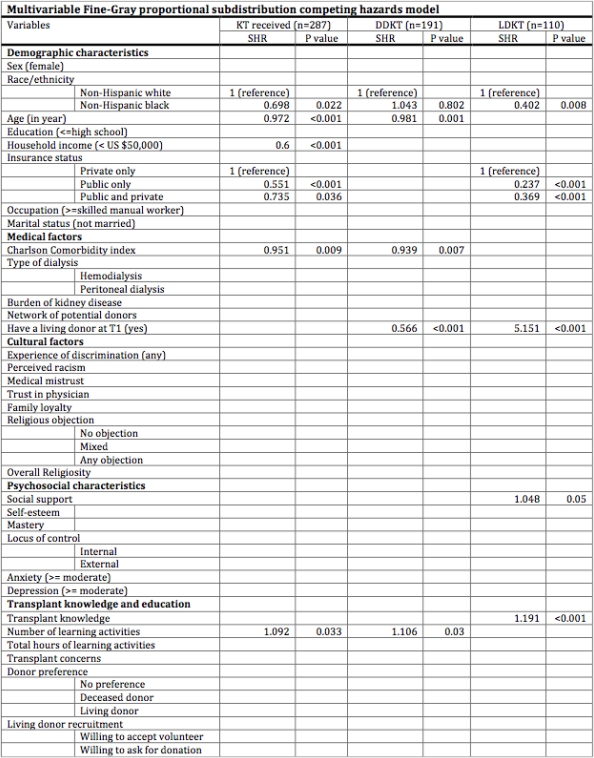Non-Medical Factors Predict Receipt and Type of Kidney Transplant
H. Wesselman,1 X. Li,1 J. Chang,1 K. Kendall,1 J. Pleis,1 E. Croswell,1 M. Dew,1 R. Shapiro,2 L. Myaskovsky.3
1University of Pittsburgh, Pittsburgh, PA
2Recanati/Miller Transplantation Institute, New York, NY
3University of New Mexico, Albuquerque, NM.
Meeting: 2018 American Transplant Congress
Abstract number: B181
Keywords: African-American, Kidney transplantation
Session Information
Session Name: Poster Session B: Kidney Psychosocial
Session Type: Poster Session
Date: Sunday, June 3, 2018
Session Time: 6:00pm-7:00pm
 Presentation Time: 6:00pm-7:00pm
Presentation Time: 6:00pm-7:00pm
Location: Hall 4EF
African Americans have a higher incidence of end-stage kidney disease but lower rates of both deceased and living donor kidney transplant (DDKT and LDKT) compared to whites. Disparities persist after adjusting for medical factors. We assessed whether race disparities would persist in receipt of KT and type of KT received (living or deceased) after adjusting for non-medical factors, including cultural (e.g., perceived discrimination, medical mistrust), psychosocial (e.g., social support, anxiety/depression), and knowledge (e.g., knowledge, concerns about transplant) factors.
We conducted a longitudinal cohort study with 1,041 patients referred for KT evaluation at the UPMC Starzl Transplant Institute. Patients completed an interview shortly after their KT evaluation, and were subsequently tracked via their medical records until receipt of KT. We used multivariable Fine-Gray proportional subdistribution hazards models for data with competing risks to estimate the rates of receiving a KT, a DDKT, a LDKT, or any other type of outcome (i.e., death, withdrawal from wait-list, or still awaiting KT) and the medical and non-medical factors associated with them.
Outcomes and predictors can been seen in Figure 1.  We only included values for the significant predictors from the multivariable models. We used blank spaces to indicate predictors that were not significant.
We only included values for the significant predictors from the multivariable models. We used blank spaces to indicate predictors that were not significant.
Even though race persisted as a significant and impactful predictor of receipt and type of KT, several non-medical factors predicted these outcomes as well, including age, household income, insurance status, having a living donor, social support, and transplant knowledge. Thus, our research identified important risk factors for receipt of KT. Transplant teams can use these risk factors to identify patients who may be in need of more support from hospital social services to ensure they receive a transplant. Further, this work provides an opportunity to design patient-centered interventions targeted toward at risk patients to increase their rates of KT.
CITATION INFORMATION: Wesselman H., Li X., Chang J., Kendall K., Pleis J., Croswell E., Dew M., Shapiro R., Myaskovsky L. Non-Medical Factors Predict Receipt and Type of Kidney Transplant Am J Transplant. 2017;17 (suppl 3).
To cite this abstract in AMA style:
Wesselman H, Li X, Chang J, Kendall K, Pleis J, Croswell E, Dew M, Shapiro R, Myaskovsky L. Non-Medical Factors Predict Receipt and Type of Kidney Transplant [abstract]. https://atcmeetingabstracts.com/abstract/non-medical-factors-predict-receipt-and-type-of-kidney-transplant/. Accessed January 8, 2026.« Back to 2018 American Transplant Congress
